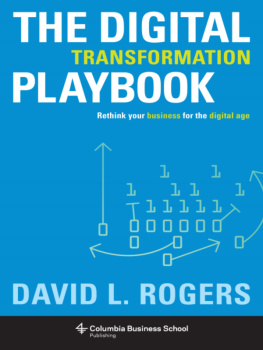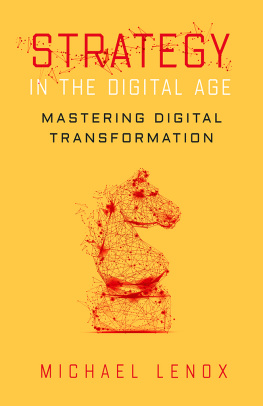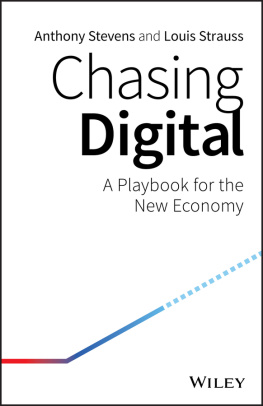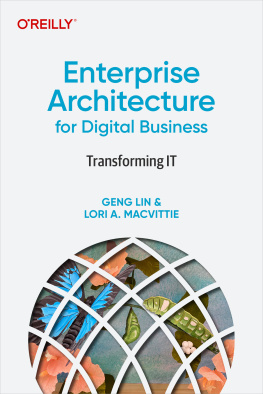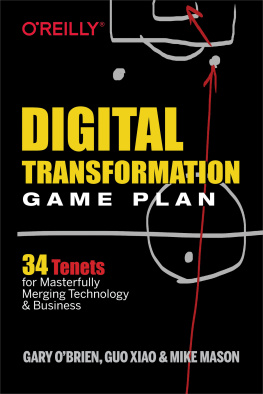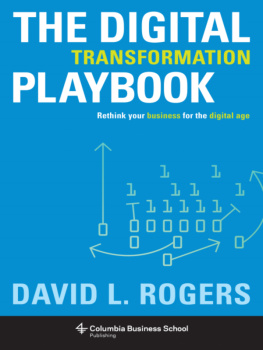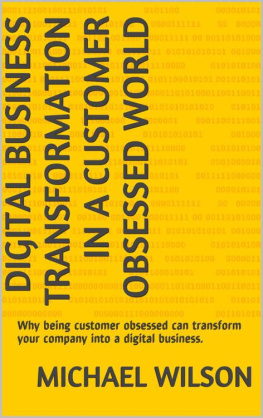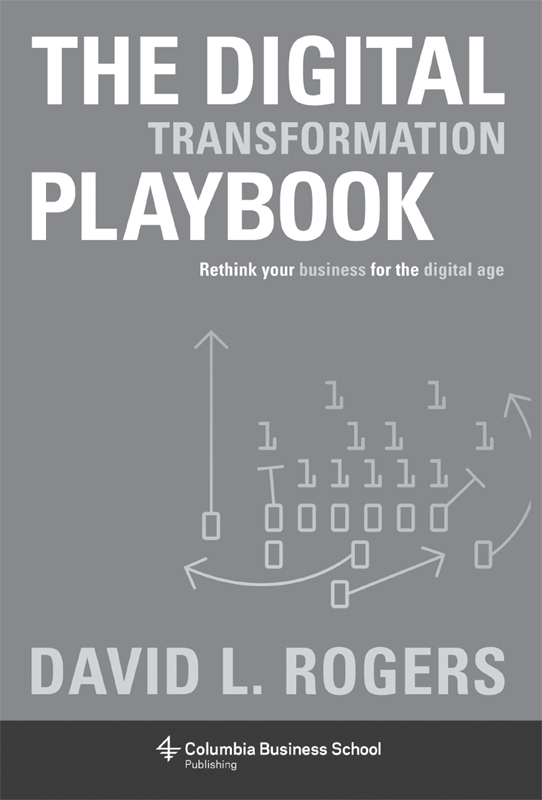THE DIGITAL TRANSFORMATION PLAYBOOK
Columbia University Press
Publishers Since 1893
New York Chichester, West Sussex
cup.columbia.edu
Copyright 2016 David L. Rogers
All rights reserved
E-ISBN 978-0-231-54165-7
Library of Congress Cataloging-in-Publication Data
Names: Rogers, David L., 1970author.
Title: The digital transformation playbook : rethink your business for the digital age / David L. Rogers.
Description: New York : Columbia University Press, [2016] | Includes bibliographical references and index.
Identifiers: LCCN 2015037126| ISBN 9780231175449 (cloth : alk. paper) | ISBN 9780231541657 (e-book)
Subjects: LCSH: Technological innovationsManagement. |
Information technologyManagement. | New products. | Strategic planning.
Classification: LCC HD45 .R6335 2016 | DDC 658.4/062dc23
LC record available at http://lccn.loc.gov/2015037126
A Columbia University Press E-book.
CUP would be pleased to hear about your reading experience with this e-book at .
Jacket design: Elliot Strunk/Fifth Letter
References to websites (URLs) were accurate at the time of writing. Neither the author nor Columbia University Press is responsible for URLs that may have expired or changed since the manuscript was prepared.
For my parents, two writers who got me writing
CONTENTS
The rules of business have changed. In every industry, the spread of new digital technologies and the rise of new disruptive threats are transforming business models and processes. The digital revolution has turned the old business playbook upside down.
In my own work, teaching and advising business leaders from companies around the world, I repeatedly hear the same urgent question: How do we adapt and transform for the digital age?
Businesses founded before the rise of the Internet face a stark challenge: Many of the fundamental rules and assumptions that governed and grew their businesses in the pre-digital era no longer hold. The good news is that change is possible. Pre-digital businesses are not dinosaurs doomed to extinction. Their disruption is not inevitable. Businesses can transform themselves to thrive in the digital age.
In this book I explore the phenomenon of digital transformation: What separates businesses that manage to adapt and thrive in a digital world from those who fail?
In pursuing the answers to this question, I have been privileged to draw on the insights, perspectives, and questions of an amazing range of executives and entrepreneurs, both through my consulting and keynote speaking, and in my Columbia Business School executive programs on digital marketing and digital business strategy. I have been able to conduct research studies on big data and marketing metrics, mobile shopping behaviors, the Internet of Things, and the future of data sharing. And for nine years, as founder of the BRITE conference, I have convened C-suite leaders from global brands, technology firms, media companies, and fast-growing startups to discuss the evolving digital business landscape.
One central insight emerged and shaped the development of this entire book: Digital transformation is not about technologyit is about strategy and new ways of thinking. Transforming for the digital age requires your business to upgrade its strategic mindset much more than its IT infrastructure. This truth is apparent in the changing roles of technology leadership within business. A Chief Information Officers traditional role has been to use technology to optimize processes, reduce risks, and better run the existing business. But the emerging role of a Chief Digital Officer is much more strategic, focused on using technology to reimagine and reinvent the core business itself.
Digital transformation requires a holistic view of business strategy. In my last book, The Network Is Your Customer, I focused on the impact of digital technologies on customerstheir behaviors, interactions, and relationships with businesses and organizations of all kinds. In this book, I take a broader scope, looking at five domains of business strategy: customers, competition, data, innovation, and value.
Like my previous books, The Digital Transformation Playbook focuses on practical tools and frameworks that readers can apply in making decisions and formulating strategies for their own business, no matter their size or industry. I have packed the text with case studies that illustrate the concepts and illuminate the strategies. My hope is that you, the reader, will bring the playbook into action by applying its lessons and discovering the next stage of value creation and growth for your business.
Acknowledgments
No book is possible without the help of many generous contributors.
I thank all the many business leaders and writers whose work is cited in the book, especially those who shared their experiences with me in detail in the classroom, onstage at conferences, or in interviews.
This book would not have happened without my agent, Jim Levine, and my publisher, Myles Thompson, championing the project at every stage from the very beginning. They both have my enduring gratitude. My editor, Bridget Flannery-McCoy, provided invaluable feedback in crafting the pitch and structure of the book. Rita Gunther McGrath, a fellow faculty member and co-conspirator at Columbia Business School, provided both rich intellectual inspiration for many ideas and critical feedback towards the end of the writing process, helping me hone the books focus and core message. Karen Vrotsos was the perfect editor of the final draft, sharpening each turn of phrase, tightening the prose, and ensuring that every idea would be clear to readers approaching it for the first time.
Columbia Business School has been the greenhouse for my work for over fifteen years. Mike Malefakis has been a great champion of my teaching as a member of the Executive Education faculty. Bernd Schmitt and Matthew Quint supported my research at the Center on Global Brand Leadership for many years. Schmitt and my speaking agent, Tom Neilssen, provided excellent advice during the initial planning of the book. Alisa Ahmadian contributed expert background research, and Oded Naaman designed the playbooks five handsome icons. Stephen Wesley at Columbia University Press and Ben Kolstad at Cenveo answered all my questions and worked arduously to keep the publication on track at every perilous turn of the process.
Lastly, I thank my wife, Karen, and son, George. They kept me going, inspired my creativity, and picked up my slack during the weeks I spent absorbed in writing. Their love is the inspiration behind all my work.
David Rogers
Montclair, New Jersey
The Five Domains of Digital Transformation
Customers, Competition, Data, Innovation, Value
You may remember the Encyclopdia Britannica. First published in 1768, it represented the definitive reference resource in English for hundreds of years before the rise of the Internet. Those of us of a certain age likely remember thumbing through the pages of its thirty-two leather-bound volumesif not at home, then in a school librarywhile preparing a research paper. In the initial debate about Wikipedia, and in the later stories of its amazing rise, that vast, online, community-created, freely accessible encyclopedia for the digital age was always compared to the Britannica, the traditional incumbent that it was challenging.

